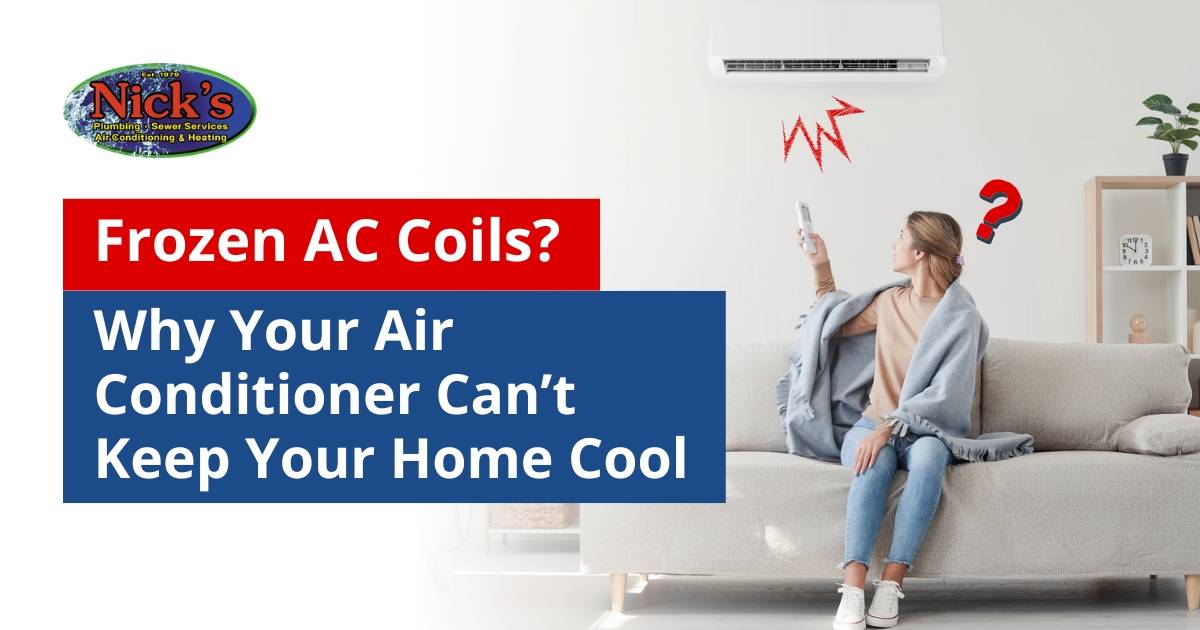Author: Jeff O'Hara
Few things are more frustrating than turning up the air conditioner on a sweltering day, only to realize your home still feels warm and muggy. If your HVAC system is struggling to keep up with demand, frozen AC coils may be to blame. When your evaporator coil freezes, it prevents your system from effectively cooling your home, increasing temperatures, humidity, and overall discomfort – along with your stress level.
Today, we’ll explore why air conditioning condenser coils are prone to freezing, how the homeowner can identify the problem, and some tips to help you remedy the situation and realize when to call a professional HVAC company.
What Happens When AC Coils Freeze and How Does it Affect Cooling?
When your air conditioner’s evaporator coils freeze, the entire cooling process is disrupted. Under normal conditions, warm air inside your home is drawn into the unit and blown across these metal coils. The refrigerant inside the coil absorbs heat from the incoming air, chills the air, and then sends the now-cooled air back into your living space.
However, when the coil becomes too cold, moisture in the air can freeze on its surface, forming an icy layer that blocks airflow. When this happens, your AC must work much harder for extended periods, often managing to push out only lukewarm air and struggling to maintain humidity levels.
What Causes AC Coils to Freeze?
Frozen evaporator coils are among the most common AC issues, particularly in Houston. When outdoor temperatures reach the high 90s or low 100s, it is nearly impossible to maintain a 68°F or 70°F indoor temperature without continually running the AC or installing a second unit and using each one to cool different areas of the house.
Most residential air conditioners are designed to reduce indoor temperatures on a hot day by about 25° degrees relative to the outside temperature, give or take a degree or three. If it’s 102° degrees outside, subtract 25° from that, and set your thermostat to 77 degrees.
Sure, it will be a little less comfortable than you might want, but the alternative is to run your AC unit for hours on full blast, day after blistering hot day, which is bad for your HVAC equipment and your electric bill.
Is Every Instance of Frozen AC Coils An Emergency?
No, it’s quite normal to experience frozen AC coils once or four times over the lifespan of your HVAC system. However, if your coils freeze repeatedly, the issue likely extends beyond a simple icing over in the heat.
A more sinister problem may be at play, such as low refrigerant levels, a malfunctioning blower motor, or a thermostat issue. While thawing the coils occasionally in the heat of August may be expected, any recurrence of frozen coils is cause for concern.
So, not every instance of frozen coils is an emergency, but repeated occurrences are cause for concern and should probably involve a call to a professional HVAC company.
What Are the Signs That Your AC Coils Are Frozen and Causing Problems?
If your air conditioner is not cooling properly and keeping your home comfortable, frozen coils could be to blame. While several of the symptoms listed below can be signs of any number of air conditioner issues, if you see more than two of these problems together, there’s a strong chance that your AC evaporator coil is freezing up.
- Your AC is Blowing Warm, Humid Air—Instead of the crisp, cool air you expect, you might notice lukewarm or hot air coming from the vents. When coils freeze, they can’t pull heat out of the air as they should, leaving your home feeling stuffy and uncomfortable.
- Visible Ice on the Evaporator Coil—If you look inside the air handler and see your AC coils are covered in ice, or you can see ice on the refrigerant lines, you’ve got a frozen coil.
- Increased Humidity in the Home—Your AC doesn’t just cool the air; it also removes excess moisture from your home. It might be worth checking the AC coils if you’ve noticed that the house feels “muggier” than usual.
- Vent Airflow is Weak – Ice buildup and clogged filters can partially or entirely block system airflow, making it appear as though your AC isn’t running as effectively as it should. If the air from the vents feels weaker than usual, frozen coils might be your issue.
If you notice two or more of these issues or see ice on the evaporator coils outside, you should completely turn off your HVAC system and allow the ice to thaw before troubleshooting.
What Can I Do To Prevent AC Coils from Freezing in the Future?
Preventing frozen AC coils starts with routine maintenance and adopting healthy HVAC habits. One of the most effective ways to maintain proper airflow is by changing air filters regularly. A clogged filter can restrict airflow, causing the evaporator coil to become too cold and freeze.
Ensure there are no blocked vents in the home, especially air return vents. These vents supply warm air to your AC for cooling. Be sure to check behind couches, dressers, curtains, and beds for any air return vents that may be hidden, which could cause obstruction.
How Regular HVAC Maintenance Helps Keep Coils from Freezing.
Regular HVAC inspections will identify potential issues before they lead to frozen coils or other significant failures in the AC system. Have one of our professional HVAC technicians check for refrigerant leaks, which can lower system pressure and cause the evaporator coil to freeze.
Monitoring refrigerant levels is essential for maintaining your air conditioner’s optimal performance. If the levels drop too low, the system won’t cool properly, leading to frozen coils.
An assessment of your thermostat may be necessary to verify any incorrect settings and ensure that it is accurately monitoring the air temperature and cooling to the requested set temperature.
When is It Time to Call an HVAC Professional to Put an End to My Frozen Coils?
While the occasional frozen coil issue may not be a sign of doom for your HVAC system, there are instances when professional intervention is necessary to resolve it.
- If your AC coils freeze frequently, especially if it’s happening on days when it isn’t very hot.
- If you’ve changed air filters and are still dealing with frozen coils.
- If your home is unusually warm and humid, regardless of how often you run your AC system.
- Unusual electrical sounds involving the outdoor condenser unit, like humming or a loud “popping” before turning on.
Why Choose Nick’s for My Frozen AC Coil Repair or Replacement?
Nick’s Air Conditioning knows the Houston heat and humidity can be brutal. When your home’s HVAC system breaks down, particularly during the hottest part of the year, it’s essential that we help you as soon as possible.
Our staff of licensed, professional HVAC experts at Nick’s Air Conditioning are enrolled in mandatory weekly training to improve their knowledge and stay up-to-date on the latest technological advancements in the HVAC industry. They’re standing by to take care of your next HVAC maintenance service, AC repair, or complete system installation.
Don’t let frozen AC coils keep you from enjoying a cool, comfortable home all summer. Call Nick’s Air Conditioning today to schedule an appointment to address your frozen coils or for any other HVAC-related service you need.
Call Nick’s Today. We’re on the Way!


